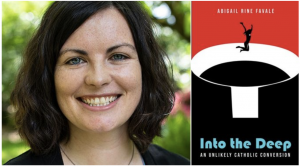Everyone loves conversion stories. Great to see delightful and intelligent folks like Abigail join us. Reaffirms our own convictions. An interview with Catholic World Report. Enjoy!
******************************************************
Intro:

-
Save
She has won awards for her fiction, published pieces in academic journals, and wrote a book that won the Feminist and Women’s Studies Association Book Prize in 2014, the year she entered the Catholic Church. She and her husband Michael live in western Oregon with their three young children.
Favale’s recent book Into the Deep: An Unlikely Catholic Conversion (Cascade Books, 2018) is a moving, insightful, and vulnerable account of her journey from the Evangelical Protestantism of her youth through feminism and then into the Church. James Matthew Wilson reviewed the book for CWR earlier this year, and my recent review of the book can be read on the National Catholic Register site. Favale recently corresponded with me about her conversion, delving into a wide range of topics, including Evangelicalism, feminism, Scripture, ideology, and much more.
******************************************************
Interview:
CWR: Right away, I was struck by the strong emphasis on place, an emphasis that eventually resulted in you coming to grips with the particularity and incarnational nature of Catholicism. Was there something about the “scandal of particularity” that bothered you about Christianity as you embraced feminism? And something about it that eventually brought you to and into the Catholic Church?
Favale: Christianity’s scandalous embrace of particularity did not bother me—in fact, this was the one thing I held onto, the lone Christian memento I kept in my pocket even as I wandered far outside the bounds of orthodoxy for over a decade. Ironically, I thought I was discovering a purer, more radical embrace of particularity through feminism, because I had the misguided understanding that Christianity denies the particularity of women. I’d concluded that Christian tradition was not incarnational enough, and needed a hearty dose of feminism to be set aright.
If anything, it was the emphatic metaphysical claims of Christianity that gave me pause—the universals, one might say, rather than the particulars. I was content to embrace—and revise—Christianity as a beautiful story, but not as an account of reality to which I was accountable. That was the central irony in the postmodern, feminist version of Christianity I’d cobbled together for myself: I believed in “incarnation,” and read about it, and wrote about it in academic gobbledygook—but only as an abstract concept. I believed in an incarnation that was not incarnate. An abstract incarnation. An “excarnate” incarnation. (Nod to Charles Taylor.) At the time, I did not realize the irony.
And yet, this enduring preoccupation with the incarnation is what eventually brought me round again—not just to Christianity, but to the Catholic Church, where the Incarnation is kept alive in the sacraments, the Eucharist, the communion of Saints.
CWR: You were raised in an Evangelical home. What were the positives of that? And what was lacking? Was there something about Evangelicalism, as you experienced it, that caused you to look to feminism for answers and a sense of belonging? ….
For the whole interview, click HERE.


